2012年中考英语二轮复习课件教材突破篇(人教版)Period 4 【Units 7-12, Book 7B】
文档属性
| 名称 | 2012年中考英语二轮复习课件教材突破篇(人教版)Period 4 【Units 7-12, Book 7B】 | 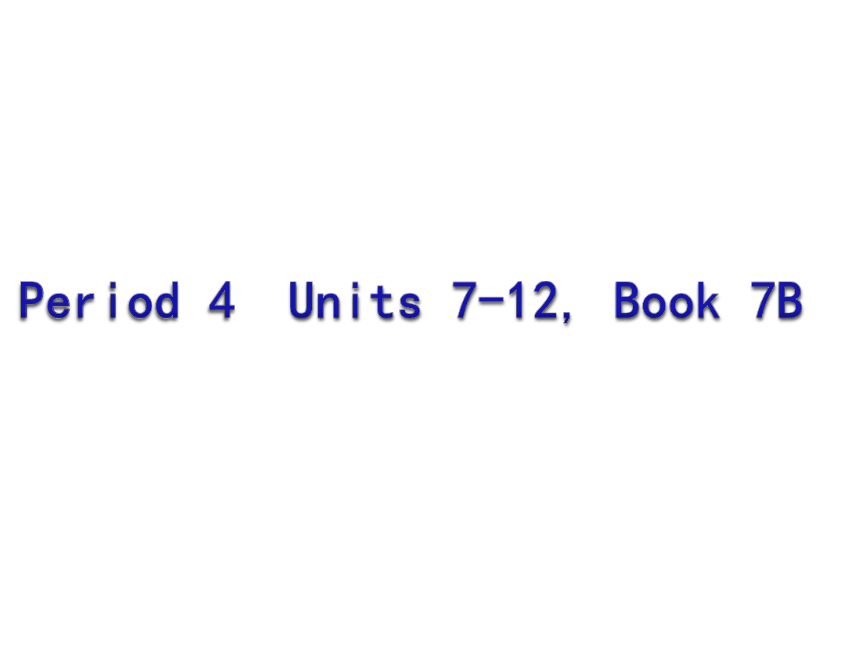 | |
| 格式 | zip | ||
| 文件大小 | 297.0KB | ||
| 资源类型 | 教案 | ||
| 版本资源 | 通用版 | ||
| 科目 | 英语 | ||
| 更新时间 | 2012-03-06 22:22:36 | ||
图片预览

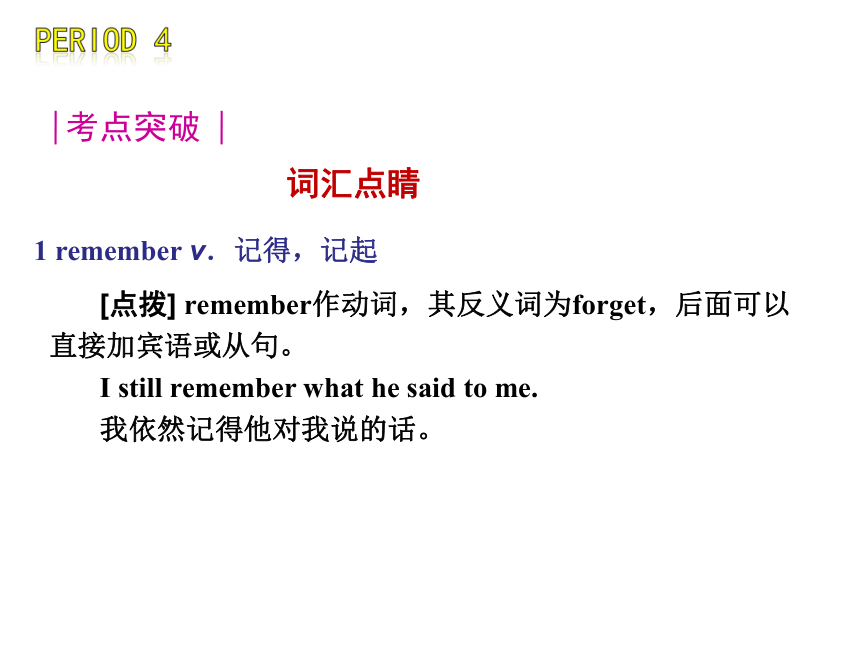
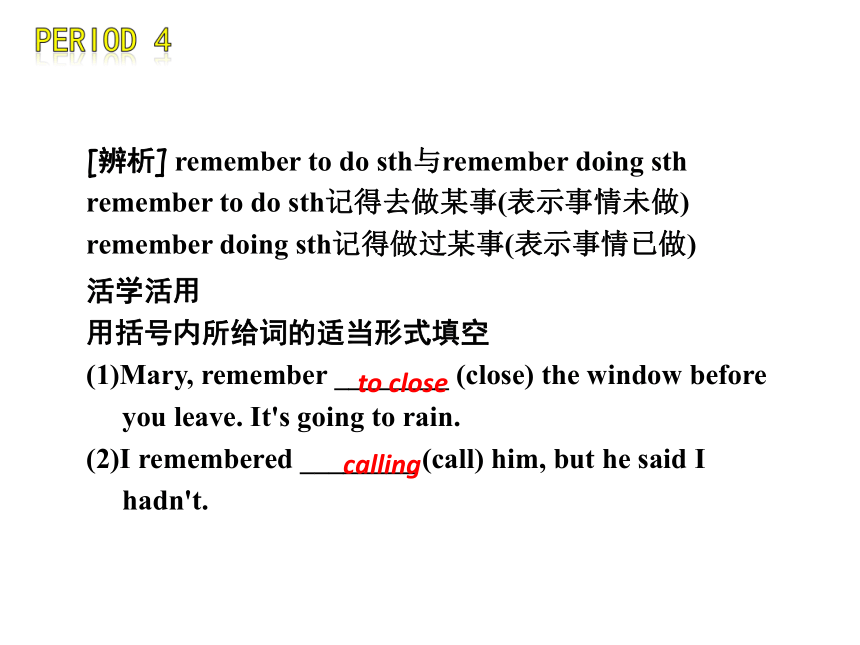
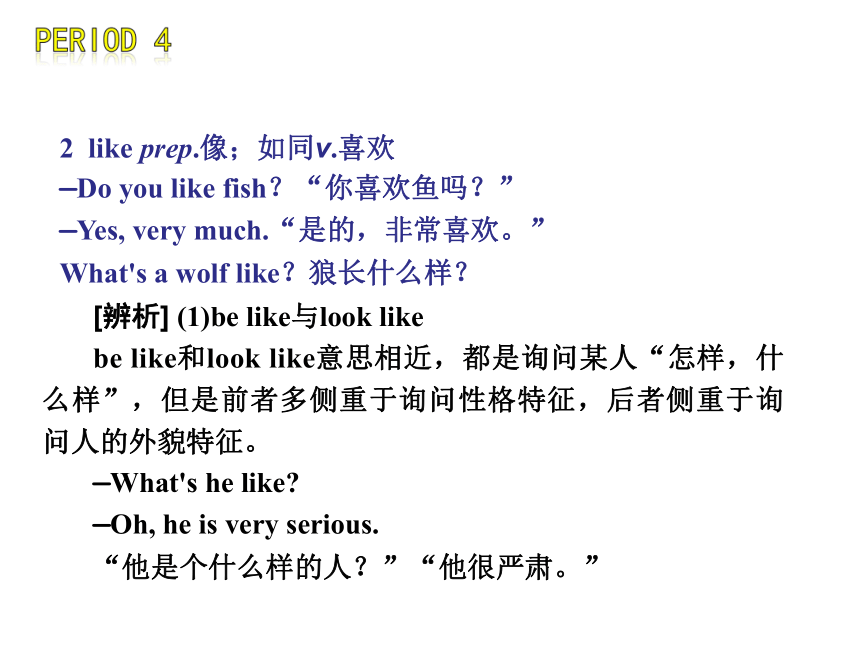
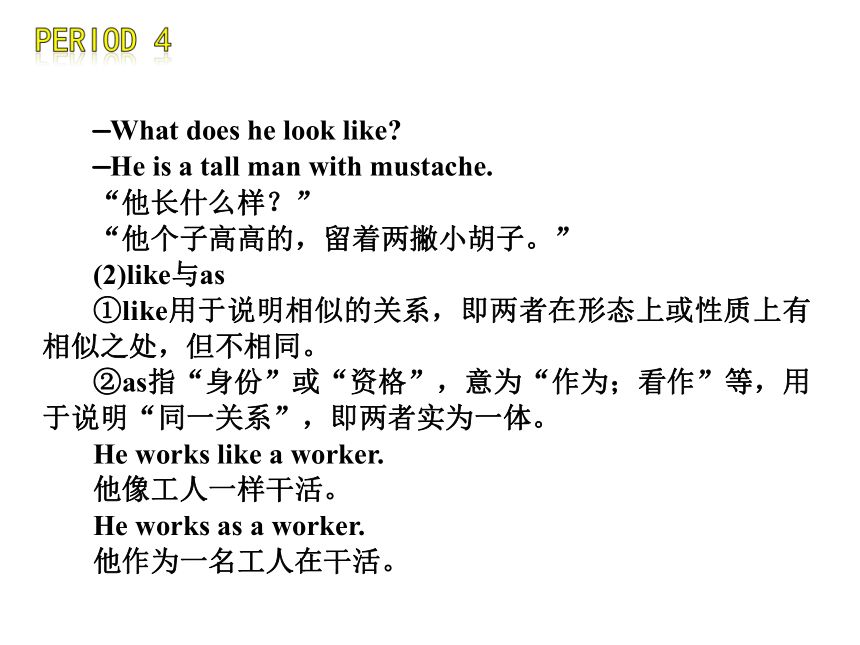
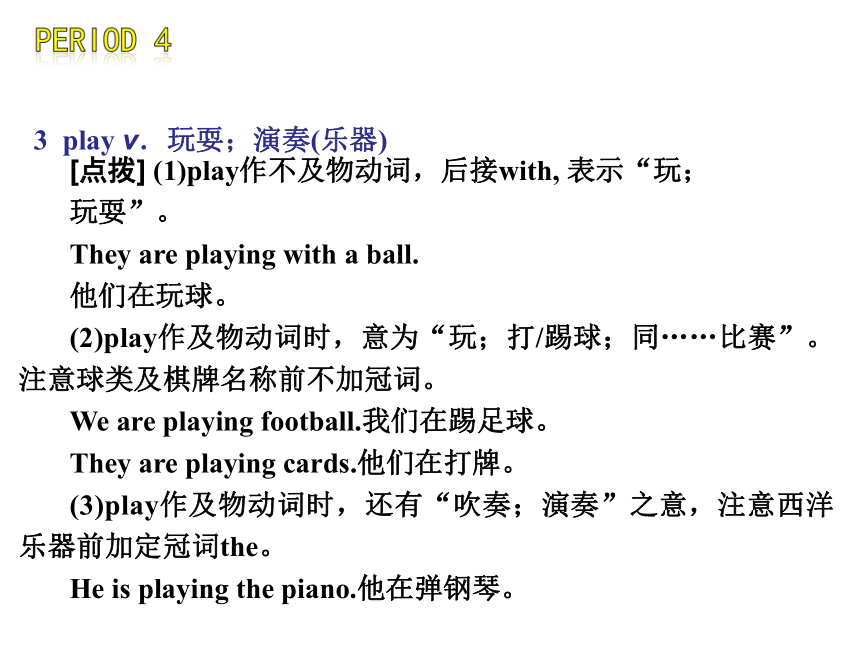
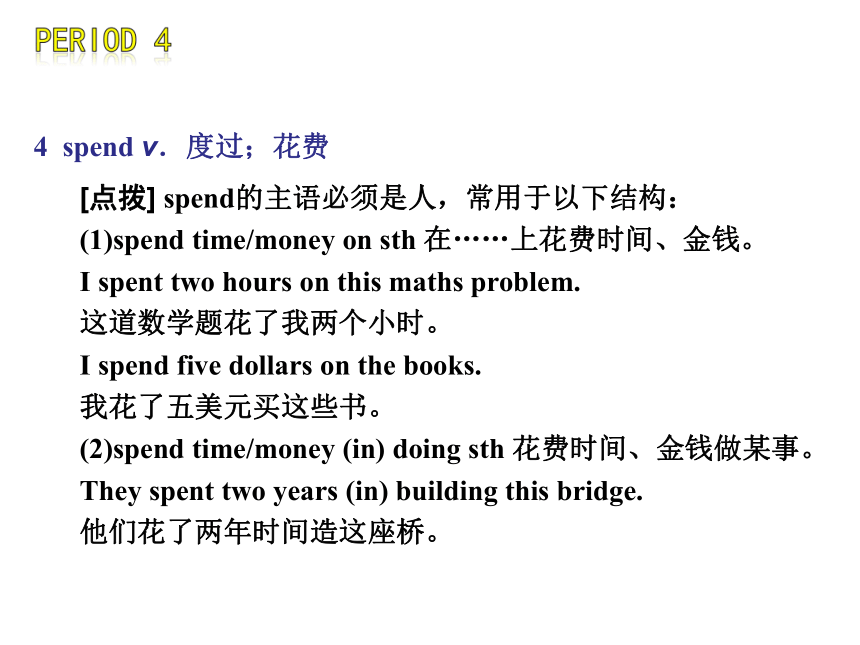
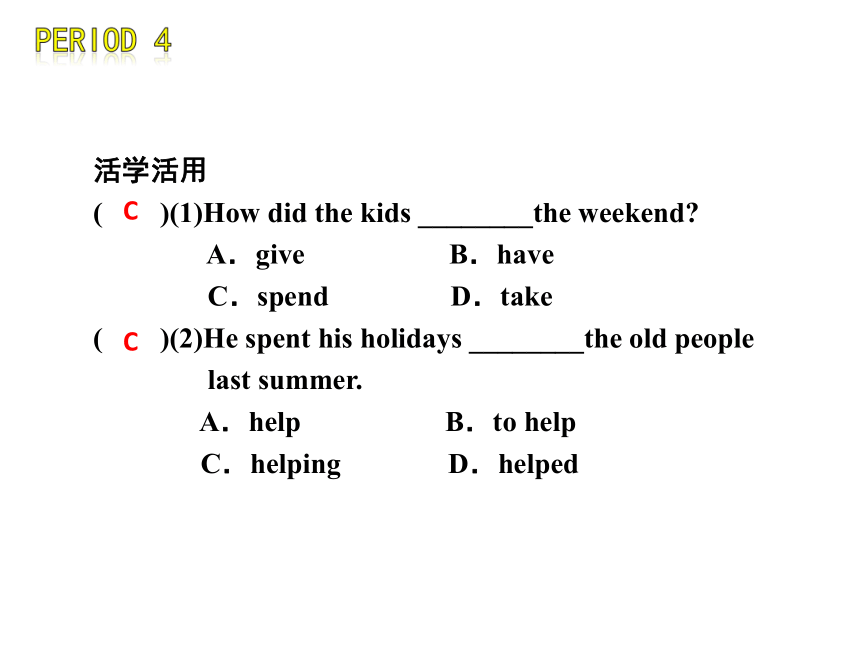
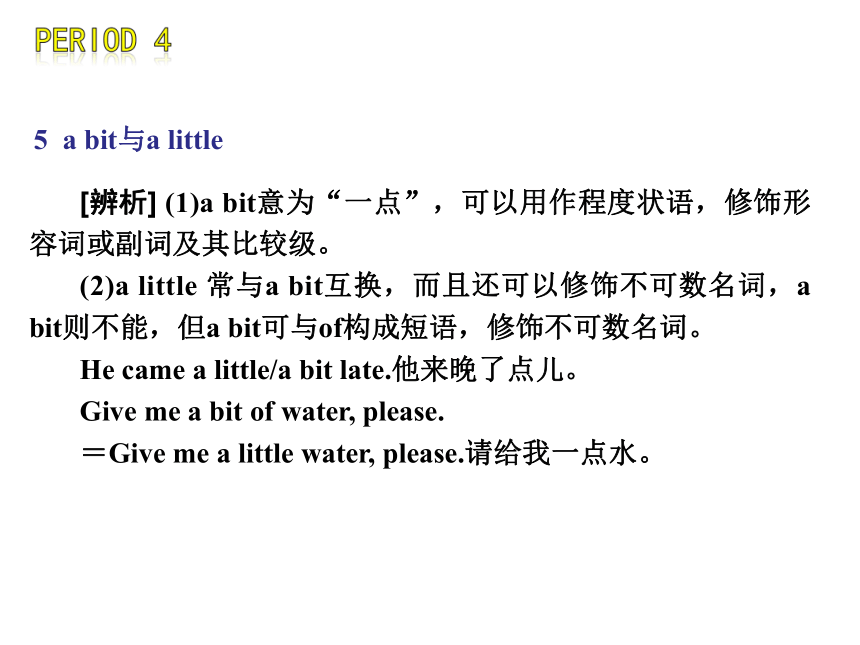
文档简介
(共26张PPT)
·吉林省专用
考点突破
·吉林省专用
词汇点睛
1 remember v.记得,记起
[点拨] remember作动词,其反义词为forget,后面可以直接加宾语或从句。
I still remember what he said to me.
我依然记得他对我说的话。
·吉林省专用
[辨析] remember to do sth与remember doing sth
remember to do sth记得去做某事(表示事情未做)
remember doing sth记得做过某事(表示事情已做)
活学活用
用括号内所给词的适当形式填空
(1)Mary, remember ________ (close) the window before
you leave. It's going to rain.
(2)I remembered ________ (call) him, but he said I
hadn't.
to close
calling
·吉林省专用
2 like prep.像;如同v.喜欢
—Do you like fish?“你喜欢鱼吗?”
—Yes, very much.“是的,非常喜欢。”
What's a wolf like?狼长什么样?
[辨析] (1)be like与look like
be like和look like意思相近,都是询问某人“怎样,什么样”,但是前者多侧重于询问性格特征,后者侧重于询问人的外貌特征。
—What's he like
—Oh, he is very serious.
“他是个什么样的人?”“他很严肃。”
·吉林省专用
—What does he look like
—He is a tall man with mustache.
“他长什么样?”
“他个子高高的,留着两撇小胡子。”
(2)like与as
①like用于说明相似的关系,即两者在形态上或性质上有相似之处,但不相同。
②as指“身份”或“资格”,意为“作为;看作”等,用于说明“同一关系”,即两者实为一体。
He works like a worker.
他像工人一样干活。
He works as a worker.
他作为一名工人在干活。
·吉林省专用
3 play v.玩耍;演奏(乐器)
[点拨] (1)play作不及物动词,后接with, 表示“玩;
玩耍”。
They are playing with a ball.
他们在玩球。
(2)play作及物动词时,意为“玩;打/踢球;同……比赛”。注意球类及棋牌名称前不加冠词。
We are playing football.我们在踢足球。
They are playing cards.他们在打牌。
(3)play作及物动词时,还有“吹奏;演奏”之意,注意西洋乐器前加定冠词the。
He is playing the piano.他在弹钢琴。
·吉林省专用
4 spend v.度过;花费
[点拨] spend的主语必须是人,常用于以下结构:
(1)spend time/money on sth 在……上花费时间、金钱。
I spent two hours on this maths problem.
这道数学题花了我两个小时。
I spend five dollars on the books.
我花了五美元买这些书。
(2)spend time/money (in) doing sth 花费时间、金钱做某事。
They spent two years (in) building this bridge.
他们花了两年时间造这座桥。
·吉林省专用
活学活用
( )(1)How did the kids ________the weekend
A.give B.have
C.spend D.take
( )(2)He spent his holidays ________the old people
last summer.
A.help B.to help
C.helping D.helped
C
C
·吉林省专用
5 a bit与a little
[辨析] (1)a bit意为“一点”,可以用作程度状语,修饰形容词或副词及其比较级。
(2)a little 常与a bit互换,而且还可以修饰不可数名词,a bit则不能,但a bit可与of构成短语,修饰不可数名词。
He came a little/a bit late.他来晚了点儿。
Give me a bit of water, please.
=Give me a little water, please.请给我一点水。
·吉林省专用
6 unfriendly adj.不友好的
[点拨] unfriendly 是由否定前缀“un”+形容词friendly构成的,“un”作前缀表示“not”。类似的词有:
happy→unhappy; lucky→unlucky;
fair→unfair; usual→unusual
活学活用
I don't like the people there because they are
________________ (friendly).
unfriendly
·吉林省专用
7 agree v.同意;赞成
[搭配] agree with sb 同意某人(的意见)
agree to sth 同意/答应某事
agree on/upon sth 对某事意见一致,达成共识
Do you agree with me about going to Hainan by air
关于坐飞机去海南的事,你同意我的意见吗?
Are they going to agree to our suggestion
他们会同意我们的建议吗?
·吉林省专用
8 have to与must
[辨析] (1)have to 意为“不得不”,后接动词原形;有各种时态形式。它着重表示客观上的需要,含有“不得已”的意味。
(2)must意为“必须”,是一个情态动词,后接动词原形;只有一种形式,常表示现在或将来的时间。它着重表示主观上认为“有义务,有必要”。
[注意] 用于否定形式时,两者的意思有很大的不同。mustn't表示“不准,不许可,禁止”;don't have to表示“不必”,与needn't同义。
We must work hard.
我们必须努力工作。(是我们自己要这样做的)
·吉林省专用
It's raining now.We have to stay at home.
现在天在下雨,我们只得待在家里。(环境使我们不得不这样做)
You must not smoke in the classroom.
你一定不要在教室里抽烟。
You don't have to worry about his studies.
你不必为他的学习而担心。
活学活用
( )It's the library! So you ________ know shouting is
not allowed here.
A.can B.must C.need D.may
B
·吉林省专用
句型透视
1 Then it was time to go home.
然后回家的时间到了。
[点拨] It is/was time to do sth 或It's time for sth 表示“到做某事的时候了”。
Hurry up, Jenny! It's time to go to school.
快点,詹妮!到上学的时间了。
It's time for breakfast, baby.
乖孩子,该吃早饭了。
·吉林省专用
2 I found a small boy crying in the corner.
我发现一个小男孩在墙角处哭。
[点拨] see, watch, hear, feel等感官动词及find等动词,后接v. ing作宾语补足语时,表示动作正在进行。而后接不带to的动词不定式作宾语补足语时,表示动作的全过程已结束或存在的事实。
I heard someone singing in the next room.
我听到有人在隔壁房间唱歌。
I saw him crossing the road.
我看到他正在过马路。
·吉林省专用
活学活用
( )(1)When she heard the exciting news, she could feel
her heart ________fast.
A.beats B.beating
C.to beat D.beaten
( )(2)We saw him ________the building and go upstairs.
A.to enter B.enter
C.entering D.entered
B
B
·吉林省专用
3 Don't eat in class.上课别吃东西。
[点拨] “Don't +动词原形”是祈使句的否定形式,意为“不要……;禁止……”,其反意疑问句用“will you”。
[归纳] (1)“Don't+动词原形”相当于“No+v. ing/n.”或You mustn't /shouldn't do sth 另外,当其表示批评性建议时,答语常用Sorry, I won't. 或类似句式。
(2)祈使句的肯定式都以动词原形开头。
Stand up! 站起来!Be quiet, please!请安静!
Let's go fishing! 让我们去钓鱼吧!
No smoking!禁止吸烟!
·吉林省专用
活学活用
( )(1)________hard and you'll catch up with your
classmates.
A.Study B.To study
C.Studying D.Studies
( )(2)—Don't be late for school next time, Jim.
—________
A.No, I don't.
B.Yes, I do.
C.Sorry, I won't.
D.Sorry, I don't know.
C
A
基础过关
·吉林省专用
词汇专练
Ⅰ. 根据句意及首字母提示完成单词
1. I ate a lot this evening because the food was d________.
2. —Do you have anything to say,Jim
—No,n_______.
3. Susan and I are in the same class. She is my c________.
4. You can see many old things in the history m________.
elicious
othing
lassmate
useum
·吉林省专用
5. She is good looking. She has long curly blonde h_____.
6. That p______ is of medium build. He has curly hair.
7. It’s good to p_______ English after class. In this way,
your English will get better.
8. I like listening to English s______. But I can't sing them.
air
erson
ractice
ongs
·吉林省专用
Ⅱ. 从方框内选词,并用其适当形式填空
1. Would you like some ________soup
2. The old woman likes wearing ________clothes.
3. Can you see that boy ________in the corner
4. Tom put on his coat and ________out.
5. He made a ________to study hard.
tomato
colorful
crying
went
decision
·吉林省专用
Ⅲ. 用所给词的适当形式填空
1. I ______ (real) don't know where he went on vacation.
2. Please read English_______ (loud) in the morning.
3. I'm sorry I didn't hear what you _____(say).
4. Thank you for ________(put) away my clothes,mom.
5. I am sad that those people are _________(friend) to me.
6. Do you enjoy ________(work) with us
really
loudly
said
putting
unfriendly
working
·吉林省专用
Ⅰ. 根据汉语意思完成下列句子,每空一词
1. 我昨天发现一个小男孩在街上玩。
I_______ a little boy________ _____the street
yesterday.
2. 昨天我们在水里玩得很开心。
We _____ _______ _____ ________ in the water.
3. 我发现一个小男孩在角落里哭泣。
I found a small boy ________ ____ ______
________.
句型专练
found
playing
had
playing
crying
on
great
fun
in
the
corner
·吉林省专用
4. 我认为你的主意不好。
I______ ______your idea ___good.
5. 他想要告诉你他的想法。
He_______ _____to tell you____ _____.
6. 学生们上体育课时必须穿运动鞋。
The students______ ___ ______sports shoes
in P.E. classes.
7. 昨天他把他的手机给同学们看。
He________ his mobile phone___ his classmates
yesterday.
8. 不要在教室里跳舞。
_______ _______in the classroom.
don't
think
would
idea
have
is
like
his
to
wear
showed
to
Don't
dance
·吉林省专用
Ⅱ. 句型转换
1. My vacation was kind of boring.(对画线部分提问)
_____ _____ _____vacation
2. There isn't anything in the museum.(改为同义句)
There___ ________in the museum.
3. Please make your friends feel happy. (用sad 替换happy变
为否定句)
______ _______your friends feel sad,please.
4. I spent $20 on the sweater. (改为同义句)
I _____ $20 ___ the sweater.
5. Why not join the football club (改为同义句)
_____ _______ ____join the football club
How
was
your
is
nothing
Don't
make
paid
for
Why
don't
you
·吉林省专用
most与the most
(1)most作名词时意为“大多数”,前面不用冠词,of后面
接表示范围的介词短语。作主语时,当of后的名词是单
数可数名词或不可数名词时,其谓语动词用单数形式;
当of后的名词是复数时,谓语动词用复数形式。
(2)the most修饰多音节形容词或副词的原级,意为“最……”。
也作much或many的最高级形式,修饰可数名词复数或不
可数名词,意为“最多”。
每日一辨
·吉林省专用
考点突破
·吉林省专用
词汇点睛
1 remember v.记得,记起
[点拨] remember作动词,其反义词为forget,后面可以直接加宾语或从句。
I still remember what he said to me.
我依然记得他对我说的话。
·吉林省专用
[辨析] remember to do sth与remember doing sth
remember to do sth记得去做某事(表示事情未做)
remember doing sth记得做过某事(表示事情已做)
活学活用
用括号内所给词的适当形式填空
(1)Mary, remember ________ (close) the window before
you leave. It's going to rain.
(2)I remembered ________ (call) him, but he said I
hadn't.
to close
calling
·吉林省专用
2 like prep.像;如同v.喜欢
—Do you like fish?“你喜欢鱼吗?”
—Yes, very much.“是的,非常喜欢。”
What's a wolf like?狼长什么样?
[辨析] (1)be like与look like
be like和look like意思相近,都是询问某人“怎样,什么样”,但是前者多侧重于询问性格特征,后者侧重于询问人的外貌特征。
—What's he like
—Oh, he is very serious.
“他是个什么样的人?”“他很严肃。”
·吉林省专用
—What does he look like
—He is a tall man with mustache.
“他长什么样?”
“他个子高高的,留着两撇小胡子。”
(2)like与as
①like用于说明相似的关系,即两者在形态上或性质上有相似之处,但不相同。
②as指“身份”或“资格”,意为“作为;看作”等,用于说明“同一关系”,即两者实为一体。
He works like a worker.
他像工人一样干活。
He works as a worker.
他作为一名工人在干活。
·吉林省专用
3 play v.玩耍;演奏(乐器)
[点拨] (1)play作不及物动词,后接with, 表示“玩;
玩耍”。
They are playing with a ball.
他们在玩球。
(2)play作及物动词时,意为“玩;打/踢球;同……比赛”。注意球类及棋牌名称前不加冠词。
We are playing football.我们在踢足球。
They are playing cards.他们在打牌。
(3)play作及物动词时,还有“吹奏;演奏”之意,注意西洋乐器前加定冠词the。
He is playing the piano.他在弹钢琴。
·吉林省专用
4 spend v.度过;花费
[点拨] spend的主语必须是人,常用于以下结构:
(1)spend time/money on sth 在……上花费时间、金钱。
I spent two hours on this maths problem.
这道数学题花了我两个小时。
I spend five dollars on the books.
我花了五美元买这些书。
(2)spend time/money (in) doing sth 花费时间、金钱做某事。
They spent two years (in) building this bridge.
他们花了两年时间造这座桥。
·吉林省专用
活学活用
( )(1)How did the kids ________the weekend
A.give B.have
C.spend D.take
( )(2)He spent his holidays ________the old people
last summer.
A.help B.to help
C.helping D.helped
C
C
·吉林省专用
5 a bit与a little
[辨析] (1)a bit意为“一点”,可以用作程度状语,修饰形容词或副词及其比较级。
(2)a little 常与a bit互换,而且还可以修饰不可数名词,a bit则不能,但a bit可与of构成短语,修饰不可数名词。
He came a little/a bit late.他来晚了点儿。
Give me a bit of water, please.
=Give me a little water, please.请给我一点水。
·吉林省专用
6 unfriendly adj.不友好的
[点拨] unfriendly 是由否定前缀“un”+形容词friendly构成的,“un”作前缀表示“not”。类似的词有:
happy→unhappy; lucky→unlucky;
fair→unfair; usual→unusual
活学活用
I don't like the people there because they are
________________ (friendly).
unfriendly
·吉林省专用
7 agree v.同意;赞成
[搭配] agree with sb 同意某人(的意见)
agree to sth 同意/答应某事
agree on/upon sth 对某事意见一致,达成共识
Do you agree with me about going to Hainan by air
关于坐飞机去海南的事,你同意我的意见吗?
Are they going to agree to our suggestion
他们会同意我们的建议吗?
·吉林省专用
8 have to与must
[辨析] (1)have to 意为“不得不”,后接动词原形;有各种时态形式。它着重表示客观上的需要,含有“不得已”的意味。
(2)must意为“必须”,是一个情态动词,后接动词原形;只有一种形式,常表示现在或将来的时间。它着重表示主观上认为“有义务,有必要”。
[注意] 用于否定形式时,两者的意思有很大的不同。mustn't表示“不准,不许可,禁止”;don't have to表示“不必”,与needn't同义。
We must work hard.
我们必须努力工作。(是我们自己要这样做的)
·吉林省专用
It's raining now.We have to stay at home.
现在天在下雨,我们只得待在家里。(环境使我们不得不这样做)
You must not smoke in the classroom.
你一定不要在教室里抽烟。
You don't have to worry about his studies.
你不必为他的学习而担心。
活学活用
( )It's the library! So you ________ know shouting is
not allowed here.
A.can B.must C.need D.may
B
·吉林省专用
句型透视
1 Then it was time to go home.
然后回家的时间到了。
[点拨] It is/was time to do sth 或It's time for sth 表示“到做某事的时候了”。
Hurry up, Jenny! It's time to go to school.
快点,詹妮!到上学的时间了。
It's time for breakfast, baby.
乖孩子,该吃早饭了。
·吉林省专用
2 I found a small boy crying in the corner.
我发现一个小男孩在墙角处哭。
[点拨] see, watch, hear, feel等感官动词及find等动词,后接v. ing作宾语补足语时,表示动作正在进行。而后接不带to的动词不定式作宾语补足语时,表示动作的全过程已结束或存在的事实。
I heard someone singing in the next room.
我听到有人在隔壁房间唱歌。
I saw him crossing the road.
我看到他正在过马路。
·吉林省专用
活学活用
( )(1)When she heard the exciting news, she could feel
her heart ________fast.
A.beats B.beating
C.to beat D.beaten
( )(2)We saw him ________the building and go upstairs.
A.to enter B.enter
C.entering D.entered
B
B
·吉林省专用
3 Don't eat in class.上课别吃东西。
[点拨] “Don't +动词原形”是祈使句的否定形式,意为“不要……;禁止……”,其反意疑问句用“will you”。
[归纳] (1)“Don't+动词原形”相当于“No+v. ing/n.”或You mustn't /shouldn't do sth 另外,当其表示批评性建议时,答语常用Sorry, I won't. 或类似句式。
(2)祈使句的肯定式都以动词原形开头。
Stand up! 站起来!Be quiet, please!请安静!
Let's go fishing! 让我们去钓鱼吧!
No smoking!禁止吸烟!
·吉林省专用
活学活用
( )(1)________hard and you'll catch up with your
classmates.
A.Study B.To study
C.Studying D.Studies
( )(2)—Don't be late for school next time, Jim.
—________
A.No, I don't.
B.Yes, I do.
C.Sorry, I won't.
D.Sorry, I don't know.
C
A
基础过关
·吉林省专用
词汇专练
Ⅰ. 根据句意及首字母提示完成单词
1. I ate a lot this evening because the food was d________.
2. —Do you have anything to say,Jim
—No,n_______.
3. Susan and I are in the same class. She is my c________.
4. You can see many old things in the history m________.
elicious
othing
lassmate
useum
·吉林省专用
5. She is good looking. She has long curly blonde h_____.
6. That p______ is of medium build. He has curly hair.
7. It’s good to p_______ English after class. In this way,
your English will get better.
8. I like listening to English s______. But I can't sing them.
air
erson
ractice
ongs
·吉林省专用
Ⅱ. 从方框内选词,并用其适当形式填空
1. Would you like some ________soup
2. The old woman likes wearing ________clothes.
3. Can you see that boy ________in the corner
4. Tom put on his coat and ________out.
5. He made a ________to study hard.
tomato
colorful
crying
went
decision
·吉林省专用
Ⅲ. 用所给词的适当形式填空
1. I ______ (real) don't know where he went on vacation.
2. Please read English_______ (loud) in the morning.
3. I'm sorry I didn't hear what you _____(say).
4. Thank you for ________(put) away my clothes,mom.
5. I am sad that those people are _________(friend) to me.
6. Do you enjoy ________(work) with us
really
loudly
said
putting
unfriendly
working
·吉林省专用
Ⅰ. 根据汉语意思完成下列句子,每空一词
1. 我昨天发现一个小男孩在街上玩。
I_______ a little boy________ _____the street
yesterday.
2. 昨天我们在水里玩得很开心。
We _____ _______ _____ ________ in the water.
3. 我发现一个小男孩在角落里哭泣。
I found a small boy ________ ____ ______
________.
句型专练
found
playing
had
playing
crying
on
great
fun
in
the
corner
·吉林省专用
4. 我认为你的主意不好。
I______ ______your idea ___good.
5. 他想要告诉你他的想法。
He_______ _____to tell you____ _____.
6. 学生们上体育课时必须穿运动鞋。
The students______ ___ ______sports shoes
in P.E. classes.
7. 昨天他把他的手机给同学们看。
He________ his mobile phone___ his classmates
yesterday.
8. 不要在教室里跳舞。
_______ _______in the classroom.
don't
think
would
idea
have
is
like
his
to
wear
showed
to
Don't
dance
·吉林省专用
Ⅱ. 句型转换
1. My vacation was kind of boring.(对画线部分提问)
_____ _____ _____vacation
2. There isn't anything in the museum.(改为同义句)
There___ ________in the museum.
3. Please make your friends feel happy. (用sad 替换happy变
为否定句)
______ _______your friends feel sad,please.
4. I spent $20 on the sweater. (改为同义句)
I _____ $20 ___ the sweater.
5. Why not join the football club (改为同义句)
_____ _______ ____join the football club
How
was
your
is
nothing
Don't
make
paid
for
Why
don't
you
·吉林省专用
most与the most
(1)most作名词时意为“大多数”,前面不用冠词,of后面
接表示范围的介词短语。作主语时,当of后的名词是单
数可数名词或不可数名词时,其谓语动词用单数形式;
当of后的名词是复数时,谓语动词用复数形式。
(2)the most修饰多音节形容词或副词的原级,意为“最……”。
也作much或many的最高级形式,修饰可数名词复数或不
可数名词,意为“最多”。
每日一辨
